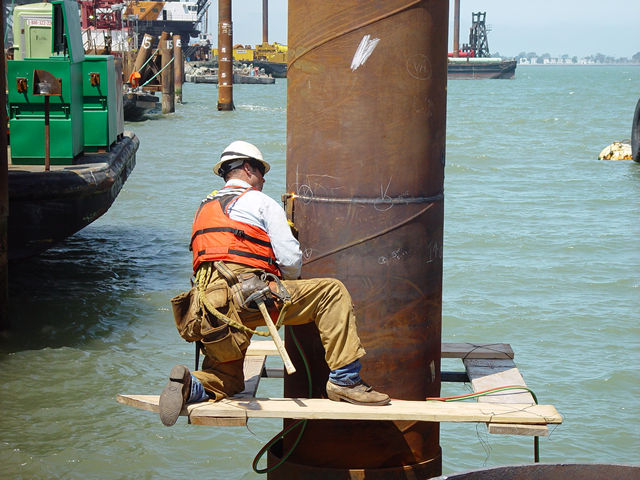Emerald Marine Products (EMP) attended the American Waterways Operator’s (AWO) Summer safety meeting in Pittsburgh on August 16-17th. EMP was pleased to witness a lot of discussion about fall-overboard situations. Specifically, The AWO Safety Committee held a panel of inland fleeting operators who spoke about the unique challenges of fleeters preventing falls overboard. We’d like to share some key learnings we took away from that panel discussion.
The number one concern is getting people to wear Personal Flotation Devices (PFD’s). Though some operators have very clear rules about wearing PFD’s on vessels, what we heard is that some don’t. EMP believes this should be a priority within your company’s rules and culture. To that point, make sure the PFD’s fit the employee properly. Nothing grows lackadaisical use more than a requirement and then not outfitting the employee with a comfortable and properly fitted PFD. Some of the fleeters mentioned employees going to the lower deck’s without PFD’s. Be consistent on company rules as to where PFD’s are to be worn and strictly enforce these rules.
There is a need to educate crew members about “situational awareness.” The panelists mentioned that newer employees tend to lack situational awareness, so it’s important that veteran deckhands share awareness of environmental conditions that may seem common-sense but need to be communicated so all employees are aware of safety hazards. When asked how many people in the audience have fallen in the water, a large majority raised their hands. When asked how many have fallen in the water more than once, a lot less hands were raised. The point here is that once a person has experienced a fall overboard they tend to be a lot more aware of how they fell in in the first place and that experience forms their safety awareness. It’s good to share that experience and awareness with those in the crew, especially the new employees.
Ask the right questions when hiring a deckhand. Speaking of new employees, some panel members suggested asking some straight-forward but telling questions when hiring someone as a deckhand. Just because someone is applying to be a deckhand does not mean that they are mentally and physically fit for working on the water. Make sure you hire a person who doesn’t have a fear of the two elements they are surrounded by for long stretches of time. Getting answers to questions like “Do you have a fear of heights?” “Do you have a fear of water?” can go a long way in making sure you hire a competent employee. Take this time to ensure they have awareness of the river environment. Also be observant of how physically and mentally fit that potential employee is. Don’t assume a potential employee with past deckhand experience could meet the physical and mental stamina of working on the river in long shifts with grueling weather and work conditions.
Proliferation of cell phones / smart phones has created distraction never seen before. Every employee is carrying a cell phone these days and needless to say, looking at a screen and not the surroundings is causing huge distraction issues. Companies need to strictly enforce cell phone usage to prevent these distractions from being fatal.
Deckhands need to stay hydrated. On hot summer days’ hydration is more intuitive but even grey days require deckhands to keep hydrated. Though the panelist mentioned hydration as an issue in keeping deckhands safe, EMP would suggest to make sure training of employees emphasize the need to keep hydrated at all times under all weather conditions.
Never turn your back on the water. This sometimes unspoken rule elicited a lot of agreement from people who have lost balance or awareness of their surroundings simply because they were moving without seeing the water. The key takeaway that EMP heard from the panelists is to make sure the vessel is always free of trip hazards. If you see something that’s a hazard move it, make the deckhand aware of the hazard so it doesn’t repeat itself. Fall-overboard occurrence is most attributed to not seeing where you’re going, losing balance and tripping.
Check your company’s handbook on the regulation of employees staying out of the water. Some of the panelists admitted their company had “no entering of water intentionally” rule. One audience member mentioned during the panel discussion an incident that occurred on a hot day. Some of the deckhands thought it would be good to go for a swim. Though they were called out for their actions, the company had no policy preventing them from doing so. Check your handbook and stress a “no entering of water intentionally” policy. It may seem superfluous but may prevent a tragedy occurring from a meaningless innocent action.
All panelists agree that the river is a dangerous place and any prevention to keep employees out of the water will have long-term benefit to employees, their families and of course the employer.

